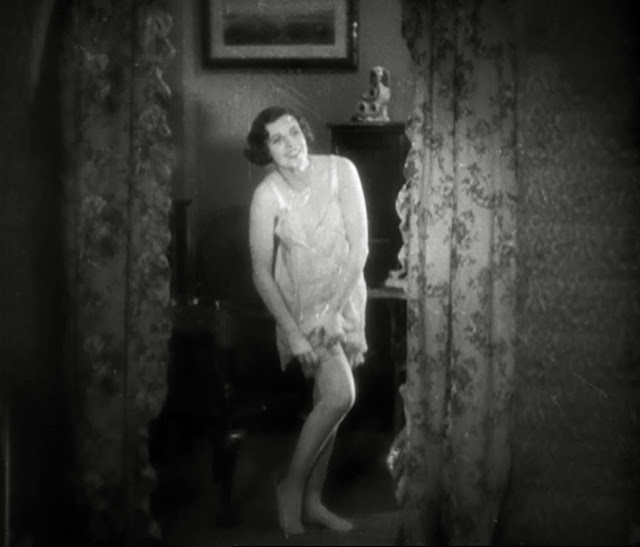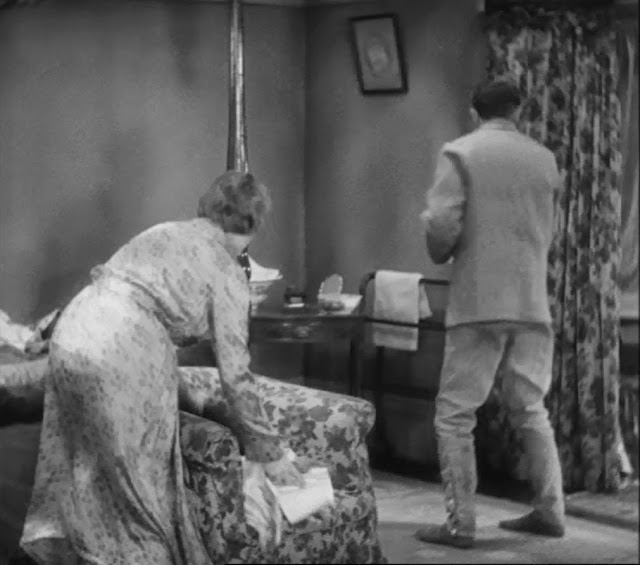Harmony Heaven (1930)
 |
| Stuart Hall & Polly Ward |
Most notable as Britain’s first “all talking” colour film (although this version is in black and white), Harmony Heaven is currently available through the kind people at Network DVD as part of Volume 1 of their British Musicals of the 1930s series.
Rumour has it that Alfred Hitchcock worked on the film as co-director although it is believed that if he did, his input was minimal.
It’s a story as old as the hills: struggling singer/songwriter (Bob Farrell played by Stuart Hall in his first film role) fails an audition for a part in a revue ...
 |
| Stuart Hall |
... the leading actress (Billie Breeze played by Polly Ward – whose birth name was Byno Poluski) ...
 |
| Polly Ward |
... takes sympathy on him and romance ensues ...
 |
| Stuart Hall & Polly Ward |
...he gets his break with her help after the revue’s star (Stuart played by Jack Raine, whose screen career stretched from 1927 to 1971 and whose final film role was in Bedknobs and Broomsticks) ...
 |
| Jack Raine |
...has an accident and he becomes overnight star ...
... their love falters after he is targeted by the vampish rich woman (Lady Violet Mistley played by the wonderfully named Trilby Clark in her penultimate screen appearance)...
 |
| Stuart Hall & Trilby Clark |
...his girlfriend winds him back; they all live happy ever after.
It’s corny, and bloody rough quality, but at least the songs are easy to hum along to: title song Harmony Heaven is perfectly good although The Raggedy Romp ...
 |
| "If you feel shivery, Wait for delivery, of the Heat you will meet, When you're doing The Raggedy Romp" |
... and Prehistoric Blues are rather silly.
It’s fun: Stuart Hall sings a dreadful song at his audition and dances like a fool - the song is about:
"A woodland glade where the elves sit down to tea."
What else?
Jack Raine’s character is supposed to be a super-stylish showbiz superstar – with a group of dancers describing him as “such a swanker.”
 |
| Jack Raine |
Blimey, she’s flexible (which he appears to appreciate!):
There’s a curious scene in which one of the revue’s cast give’s a (in modern parlance) gay performance of the line’s (insert lines). The director shouts out “Can’t you say it like a man?” And he replies “No I can’t.”
It’s an odd interlude that seems to say “let’s all laugh at the fairy”.
And finally:
It seems that sex was a big selling point in 1930s British cinema. In Harmony Heaven there's a scene in which Polly Ward gets dressed ready to meet Stuart Hall. Shot through a curtained arch, which separates us from the scene and puts the audience in a voyeuristic position, we see her pull on and fix her stockings:
 |
| Polly Ward |
 |
| Polly Ward |
It seems that British films of the 1930s had a slightly fetishised view of women’s underwear. Previously I had never imagined that British cinema of this period had been a stepping stone on the gradual sexualisation of cinema. But it seems that in 1930s British films you could hardly get away from women getting dressed, undressed or waving their underwear around:
Most famously, there's the scene inThe 39 Steps where Robet Donat flashes Madeleine Carroll's stocking tops as they try to get dry...
... and she has to remove them whilst still handcuffed to him:
... and she has to remove them whilst still handcuffed to him:
Whilst that scene is often celebrated as an example of Alfred Hitchcock's voyeuristic tendencies, he wasn't the only director offering his audiences tantalising glimpses of thigh or - if they weren't quite that daring - a view of a lady's undergarments (even if she wasn't wearing them).
In Escape (1930) we watch as a woman hides her stockings and knickers from the gaze of the escaped convict ...
In Escape (1930) we watch as a woman hides her stockings and knickers from the gaze of the escaped convict ...
...only to wave them at him moments later.
The next woman he meets also can’t stop herself from removing her stockings on screen.
Over She Goes (1937) also has a scene of man wandering around with the leading lady’s stockings in his breast pocket and her ‘step-in’ underwear hanging off his tailcoat - until he bumps into his girlfriend and gets into trouble:
In 'Cheer Up' the audience gets to see Sally Gray dancing in her knickers and leaning out of the window in her underwear:
And in Brief Ecstasy Hugh Williams seems to have an obsession with Linden Travers’s legs. He’s constantly touching or staring at them:
So next time someone refers to the early evidence of voyeuristic tendencies in Alfred Hitchcock's work in The 39 Steps, you can tell them: "Everyone was at it in British films in the thirties ..."
Oh well, I suppose some things never change ...
Oh well, I suppose some things never change ...



















No comments:
Post a Comment